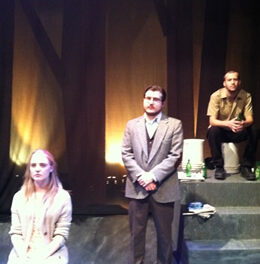When I entered UNC School of the Art’s Catawba Theatre, a black box space slowly filling with audience members, I was unsure of the kind of story that awaited me that Sunday afternoon. I looked at the beautiful set, adorned with clotheslines on either side, trying to read into the kind of show I was watching. I was familiar with Indecent, written by Paula Vogel, which tells the story of Sholem Asch’s God of Vengeance as it traveled through Europe, to the United States, and back to Europe again, this time during the Holocaust. However, UNCSA’s production felt warmer, more intimate than other productions. I noticed the theater was also considerably silent, with no pre-show music playing. All that was provided for expectation was one intriguing line projected onto the back wall: “Indecent: The True Story of a Little Jewish Play,” with the translation in Yiddish below it.
The Yiddish translation continued into the curtain speech, as we were told to silence cell phones and keep masks on. It was a lighthearted transition into a show that felt so solemn in the moments as we took our seats. This theme would continue through the journey we took with the actors as they told the story of The God of Vengeance. I found myself laughing surprisingly often, and I remain impressed by the cast and director’s ability to find such joy in a piece with that deals with bleak topics like anti-Semitism and censorship. There were moments of dancing and singing to beautiful Jewish music, and moments of heart-wrenching quiet.
The play opened with the silhouettes of characters known as The Dead Troupe, rising from the ashes, to tell the story of Asch’s play. They quite literally shook dust off themselves as they transitioned into our world by coming into the light. Lemml, the stage manager character, introduced the Elder, the Middle, and the Ingenues, who play characters that fall into those archetypes throughout the show, and introduced the clarinetist, violinist, and accordionists. Lukey Klein’s Lemml was a force of narrative power in the play. Their execution of this nuanced, yet firm character pulled us into the world of Indecent, where it felt as if the fourth wall did not exist. In fact, it was their consistency that tightly pulled together a cast of brilliant young actors. As the story continued to show Sholem and Madje Asch in bed as Madje read the play for the first time, the significance of elements of the set began to be unveiled. The suitcases sitting on the edge of the stage acted as rehearsal blocks, sometimes becoming beds or chairs or bars, while also symbolizing the show’s permanent transience. Each scene was a “blink in time,” switching from country to country and year to year, with the projected time and place on the back wall to remind the audience of the chronological movement of the play.
Once Madje (Anna Lei Negrin) convinces Sholem (Jason Sanchez) that his play is a masterpiece, Sholem takes it to Mr. Peretz in hopes of getting his play read and produced. Although he does not receive the response he had hoped for, Lemml, a young tailor, falls in love with the play—the first he’s ever seen. Sholem takes Lemml on as his stage manager; together, they take the play to Berlin. In the Berlin cabaret number, as well as in the dances throughout the show, this cast’s abilities were only magnified through Ishmael Gonzalez’s eclectic and enticing choreography. This movement was as much a part of the narrative as the dialogue, and it became integral to the audience’s understanding of the show. When words and dance weren’t enough, then came the music. With a score and original music by Lisa Gutkin and Aaron Halva, we travel through different countries and time as the play made its way through Europe and then to the States. Here, we see the harsh contrast of immigrants’ expectation of America to the trials of immigrant life on American soil as the members of the troupe rip out the curls under their shtreimel, symbolic of their painful transition into becoming more acceptable in a new land. As a daughter of immigrants myself, director Acadia Barrengos’ treatment of this topic felt incredibly close to home.
Eventually, the play makes it to Broadway. However, significant edits had been made, so members of the cast feel disgusted about performing in it, yet still do, as they must make money. Once the show is presented, the cast and crew are promptly arrested due to its content matter. The show is denounced by Rabbi Silverman (Ishmael Gonzalez), whose rich and declarative voice rings out through the crowd with defamatory claims about Sholem Asch’s betrayal to his countrymen in writing such a profane play. The God of Vengeance goes to court and loses, leading Lemml to return to Europe. It is in Europe that the play is performed in attics, cafes, and cellars, until it meets its fateful end during the Holocaust. During a performance of Act II, we hear the sound of boots kicking down a door. The lights go dark and rise on Lemml as the cast waits in line at Auschwitz. Years later, John Rosen attempts to convince Sholem to allow him to put on a new English translation of the play. Sholem refuses and is left alone in his living room. Lemml appears and takes him by the hand. Together with the Dead Troupe, they watch Rifkele and Manke share a kiss under the rain, this time with actual water.
UNCSA’s production was a cohesive and impressive work of art. The cast and their director seemed to pay attention to every detail, with stunning accents, movement, and song that told the beautiful story of this play’s journey. They allowed the audience to feel moments with them, as if they were experiencing them for the first time: with genuine joy, sadness, and anger. This production’s incredible authenticity brings to light the little-known story of a play that speaks on what it is to be Jewish, Queer, an immigrant, and human.
Indecent continues at UNCSA through Saturday, November 6. For more details on this production, please view the sidebar.












